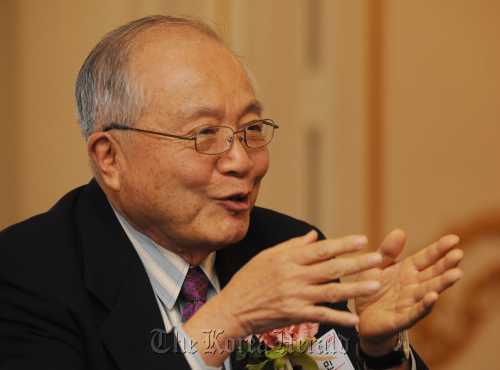University of Hawaii professor Sohn receives 3rd Korea Foundation award
As a scholar who has spent the past four decades studying his mother-tongue and language in general, professor Sohn Ho-min should know what he’s talking about when he says Korean is the world’s most superior language.
“When we say Korean is superior, we are basing this on scientific examination. The Korean language’s method of making sound through a combination of vowels and consonants is very scientific and economical, even,” professor Sohn of the University of Hawaii told a news conference in Seoul, Thursday.
Sohn, who studied linguistics at Seoul National University and earned his Ph.D. in linguistics at the University of Hawaii in 1969, received the third Korean Foundation Award Thursday, in recognition of his decades-long role as a promoter of the Korean language in the United States.
Among his various roles, Sohn worked on creating a 19-volume set of Korean language text books, which were first released in 2000 and are now used by some 800 universities throughout the United States.
“It took us six years to make the books. We tried to explain not just the language and grammar, but the Korean culture and the country in general as well, knowing it is much more difficult for Americans to learn Korean compared to European languages,” Sohn said.
Sohn said he has been feeling the influence of K-pop around the world with the number of Korean language students increasing rapidly in the last three to four years.
As a scholar who has spent the past four decades studying his mother-tongue and language in general, professor Sohn Ho-min should know what he’s talking about when he says Korean is the world’s most superior language.
“When we say Korean is superior, we are basing this on scientific examination. The Korean language’s method of making sound through a combination of vowels and consonants is very scientific and economical, even,” professor Sohn of the University of Hawaii told a news conference in Seoul, Thursday.
Sohn, who studied linguistics at Seoul National University and earned his Ph.D. in linguistics at the University of Hawaii in 1969, received the third Korean Foundation Award Thursday, in recognition of his decades-long role as a promoter of the Korean language in the United States.
Among his various roles, Sohn worked on creating a 19-volume set of Korean language text books, which were first released in 2000 and are now used by some 800 universities throughout the United States.
“It took us six years to make the books. We tried to explain not just the language and grammar, but the Korean culture and the country in general as well, knowing it is much more difficult for Americans to learn Korean compared to European languages,” Sohn said.
Sohn said he has been feeling the influence of K-pop around the world with the number of Korean language students increasing rapidly in the last three to four years.

“More than half of the students are saying they are learning Korean to know more about Korean pop music,” he said. “This is an encouraging phenomenon for us even if it’s just temporary.”
University of Hawaii had about 480 students sign up for Korean language classes last semester, an enormous increase from the 30 students who registered to learn the language when Sohn became a professor in 1981. Some 390 students signed up for Chinese classes and 1,200 chose to learn Japanese last semester.
The University of Hawaii is considered a leading U.S. school in the field of Korean studies with only five universities, including UCLA, Brigham Young, Ohio State, and SUNY Binghamton, currently offering degree programs in Korean studies.
While the number of students wanting to learn Chinese and Japanese has been somewhat consistent during the past decade, the growing interest in Korean is pretty clear, Sohn said.
In 2007, Sohn became the director of the university’s Korean Language Flagship Center, which is the first and only Korean language center in the United States dedicated to educating Korea specialists in various fields ― sociology, politics, economy and the arts ― with exceptional linguistic ability in Korean. It offers both B.A. and M.A. programs, along with non-degree programs.
“My plan, at the moment, is to retire in about two years after handing over my role to younger professors,” Sohn said. “I really want to finish what I’ve been doing regarding the Ph.D. students I’ve been teaching.”
“I am very happy to receive this award. It always feels good to be praised for doing something right,” he added.
The Korea Foundation Award was established in 2008 to encourage and recognize people who have helped promote Korea and its culture overseas.
The first award was given to Swiss-native Korean historian Martina Deuchler and the second to John Duncan, the director of the UCLA Center for Korean Studies.
By Shin Hae-in (hayney@heraldcorp.com)



![[AtoZ into Korean mind] Humor in Korea: Navigating the line between what's funny and not](http://res.heraldm.com/phpwas/restmb_idxmake.php?idx=644&simg=/content/image/2024/04/22/20240422050642_0.jpg&u=)
![[Exclusive] Korean military set to ban iPhones over 'security' concerns](http://res.heraldm.com/phpwas/restmb_idxmake.php?idx=644&simg=/content/image/2024/04/23/20240423050599_0.jpg&u=20240423183955)



![[Graphic News] 77% of young Koreans still financially dependent](http://res.heraldm.com/phpwas/restmb_idxmake.php?idx=644&simg=/content/image/2024/04/22/20240422050762_0.gif&u=)
![[Herald Interview] Why Toss invited hackers to penetrate its system](http://res.heraldm.com/phpwas/restmb_idxmake.php?idx=644&simg=/content/image/2024/04/22/20240422050569_0.jpg&u=20240422150649)





![[Exclusive] Korean military to ban iPhones over security issues](http://res.heraldm.com/phpwas/restmb_idxmake.php?idx=652&simg=/content/image/2024/04/23/20240423050599_0.jpg&u=20240423183955)



![[Today’s K-pop] Ateez confirms US tour details](http://res.heraldm.com/phpwas/restmb_idxmake.php?idx=642&simg=/content/image/2024/04/23/20240423050700_0.jpg&u=)